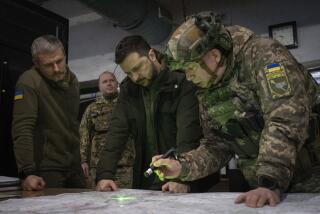Yeltsin Comes to the Defense of Russian Military
- Share via
MOSCOW — President Boris N. Yeltsin on Thursday described Russia’s relationship with the United States and NATO as “difficult” and pointedly endorsed recent Russian military moves in Kosovo and over the Atlantic that alarmed the West.
Before a group of military brass at the Kremlin, Yeltsin praised a Russian exercise two weeks ago in which two TU-95 Bear bombers headed uncomfortably close to NATO airspace, flying within 60 miles of Iceland before being turned back by U.S. jets.
Yeltsin also singled out Col. Gen. Viktor Zavarzin, who led about 200 Russian troops in seizing the airport at Pristina, Kosovo’s capital, hours before NATO peacekeepers arrived in the Serbian province last month. “Thank you for Kosovo,” Yeltsin told Zavarzin.
Reinforcing his message that the days of backslapping diplomacy are over, Yeltsin declared that Russia’s relationship with NATO and the United States is “extremely subtle, delicate and difficult.”
“Of course, we will not engage in an all-out quarrel with NATO, but neither do we intend to flirt with it,” Yeltsin told the televised meeting.
The Russian leader warmly shook hands with each officer.
The Russian deployment in the war-torn province June 12 stunned NATO leaders. It took painstaking diplomatic negotiations to iron out the question of Russia’s role in the peacekeeping operation. The end result of Zavarzin’s mission apparently pleased Yeltsin: He ordered Defense Minister Igor D. Sergeyev to give the officer a medal.
Despite Russia’s declining international clout and its demoralized and impoverished military, it managed several times in recent months to antagonize NATO.
The most recent of a series of misunderstandings, provocations and outright disagreements between Russia and NATO came last weekend after Russia tried to reinterpret the terms of a deal hammered out last month in Helsinki, Finland, on how Russian peacekeepers would be deployed in Kosovo. NATO officials asked nations bordering Yugoslavia to deny Russia permission to fly in troops through their airspace. Talks early this week resolved the dispute.
As Yeltsin spoke Thursday, three Russian ships departed the Black Sea port of Tuapse carrying paratroops headed for Kosovo as part of the Russian peacekeeping contingent.
Russia, no longer a superpower but still extremely sensitive on the question of its global status, was wounded when NATO refused to be swayed by Moscow’s opposition to the alliance’s 11-week air campaign against Yugoslavia. In trying to reassert Russia’s world status, Yeltsin on Thursday improbably referred to his country as the “reviving great Russia.”
Russia’s army is a shambles, its equipment is run-down and its soldiers sometimes go hungry. Yet Yeltsin said the recent West 99 military exercise--a simulated reaction to a NATO invasion--was a sign that the army is being reformed.
“They [in the West] repeat over and over again that our army is in total decay,” he said. “To use a not-so-literary term, it is an utter lie.”
Andrei A. Piontkovsky, an analyst with the Independent Institute for Strategic Studies in Moscow, said the Russian seizure of Pristina airport was “the only military victory Yeltsin has ever had. Before that, he only had defeats.”
Yeltsin also backed the Interior Ministry in several recent skirmishes on the border with the separatist republic of Chechnya. “Bandits [from Chechnya] terrorizing people have been given a proper rebuff,” Yeltsin said, but he warned: “Don’t allow this to turn into a war.”
Russian forces failed to subdue the republic during a 1994-96 war. Though it remains part of Russia, Chechnya is now largely out of Moscow’s control, torn by violence and infested by gangs that make their living kidnapping Russians and Westerners for ransom.
More to Read
Sign up for Essential California
The most important California stories and recommendations in your inbox every morning.
You may occasionally receive promotional content from the Los Angeles Times.













